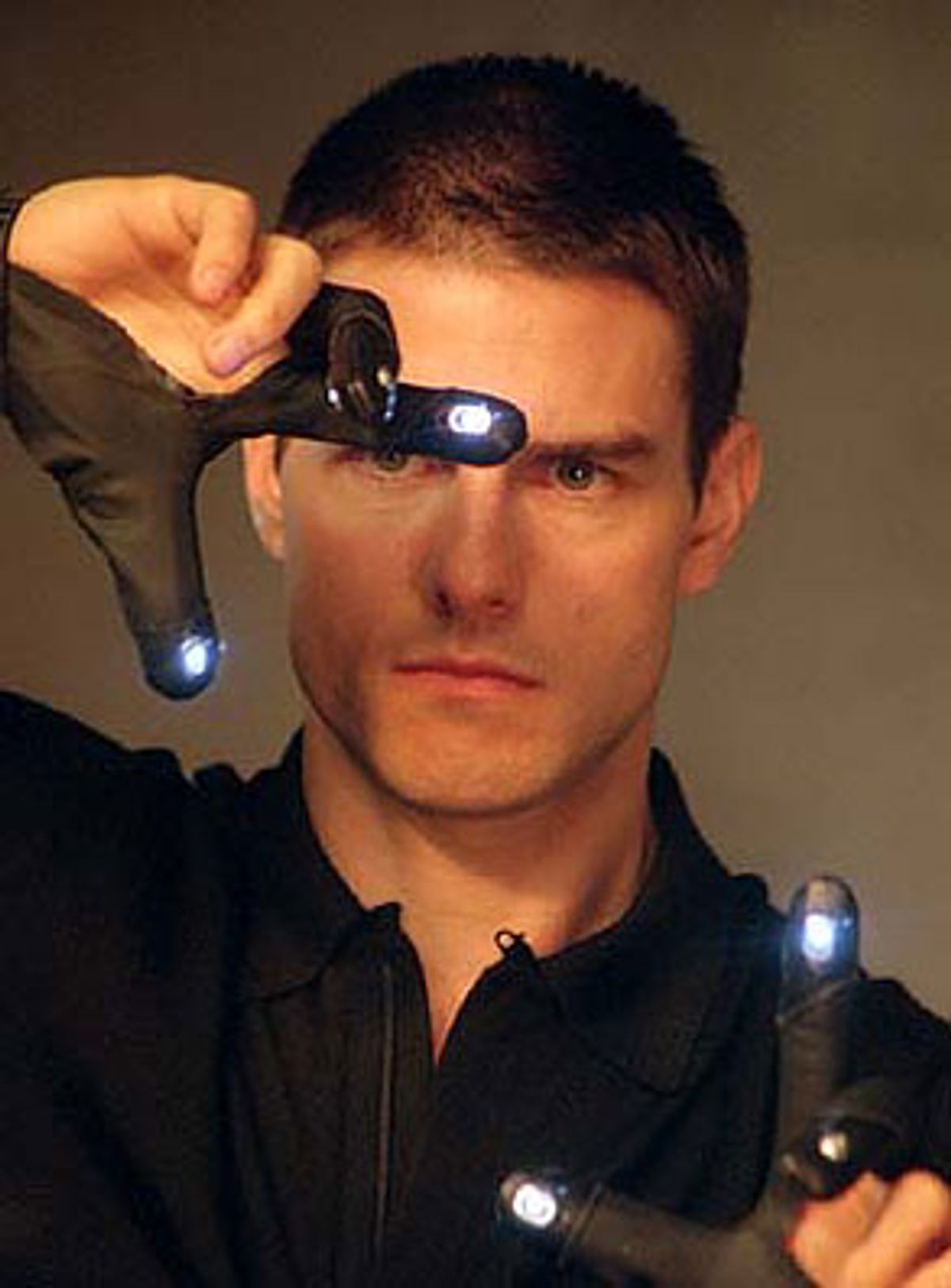Whatever different critics think of "Minority Report" overall, they seem to agree on the brilliance of one passage. It involves Tom Cruise standing before a strange set of screens with all the arrogance and magnificent intent of a great orchestral conductor. The sections of his orchestra are "glimpses" of a possible future, small stretches of something like film, delivered by "pre-cogs," that he can conjure with, enhance, develop or wipe aside with the finality of a Balanchine who knows this or that pale girl can never dance for real. I don't think Tom Cruise has ever been as powerful or as interesting. This could be the sexiest scene he's ever done.
"Minority Report" is a long film -- far too long for its own good -- yet it never begins to offer a plain, practical explanation of how pre-cogs work. That doesn't matter: The notion that, suspended in liquid, with heightened sensitivities, they can somehow perceive flashes or shots of what will happen is satisfactory sci-fi. They can do it because they can pick up intuitively on the intense, dark desires of people like us. That's a workable concept, and it becomes much more in the image and haunted Auschwitz presence of Samantha Morton as Agatha, the most acute (and vulnerable) of the floating seers. Morton leaps across plausibility with the same ease Cruise has (and this, in turn, manages to establish how uneasy Cruise -- cocksure or nothing -- felt in "Eyes Wide Shut" and "Vanilla Sky").
But here's my real point. "Minority Report" is a Steven Spielberg film (from a story by sci-fi writer Philip K. Dick, and with a decided nod to Stanley Kubrick). And Spielberg is all the odder as a guy and a creator in that he is so aloof to sexiness. Think of his work: Recollect the stress on the child's imagination; the happy army of men against truck, destiny or shark; the rather meager role women play (think of that wife in "Jaws"!). Remember that Spielberg has been married to two actresses without ever coming anywhere near celebrating them on film -- after all, even Kubrick, another lone cold wolf, couldn't look at Kidman in "Eyes Wide Shut" without beginning to discover eroticism, at his time of life!
In other words, our most successful filmmaker, our "genius," doesn't really do "sexy," which is one of the essential impulses or cravings in the history of film. But in "Minority Report" it begins to seeps in at the corners, like those undeniable spiders that have to read our eyeballs. Not that it's conventional: Samantha Morton is a wonder, but she's not sexy; and the estranged wife here (as well as being one of the most implausible characters) is a creature suffering from terminal neglect.
But what is sexy is the way imagery itself is made fluid, fluent, as pressing as come, as desperate to get into other similar fluids, to make a cut and a connection. I said that Cruise resembled a conductor or a Balanchine in front of his assembled cuts of film. But, of course, the real point of reference is to a film editor, clutching strands of film and swaying and experimenting in his efforts to cut or compose them into a whole. If you've ever seen a great movie editor, working as they do these days on video machines, then you've seen Tom Cruise in this film. In short: What excites, arouses and turns Steven Spielberg on in "Minority Report" -- and does the same for us -- is the prospect of filmmaking, of taking Shot A and joining it to Shot B so that the alphabet explodes, or becomes pregnant.
As we watch these shots on the verge of becoming recognizable sequences, we are watching simple cell structures yearning to mesh and build -- the sexual thrill is that of beholding new life coming into being. And by far the most potent strain in "Minority Report" is the way the whole movie feels wet, alive and throbbing -- just like the sexual organs in intercourse. Steven Spielberg has got sex at last, even if the inspiration has been the astonishing visual machines that he commands. "Minority Report" is a ruined masterpiece: All the Max von Sydow stuff is dumpable, from another, archaic film form. But as a wounded lyric on the way seeing has become our central song of desire, it is unforgettable.



Shares